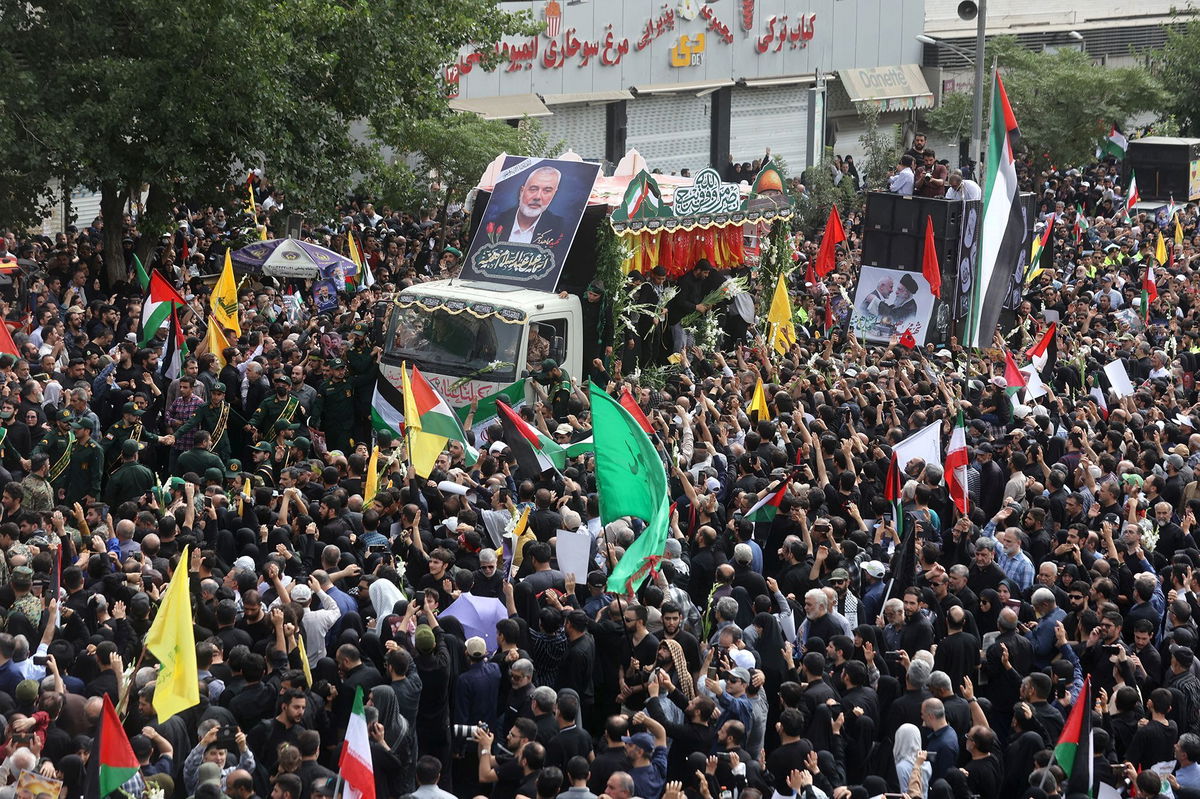Iran says it will not take ‘hasty action’ against Israel for killing of Hamas political leader

Iranians attend the funeral procession of Hamas chief
(CNN) — Iran’s pledged retaliation against Israel for the killing of Hamas political leader Ismail Haniyeh in Tehran will take time, according to a spokesperson for the country’s Islamic Revolutionary Guard Corps (IRGC).
“Time is on our side and the waiting period for this response may be prolonged,” Ali Mohammad Naeini was quoted as saying on Tuesday by state media.
The Middle East has been on high alert since last month’s assassination of Haniyeh in Tehran, which came the day after Hezbollah commander Fu’ad Shukr was killed in an airstrike in Beirut.
Israel took responsibility for the killing of Shukr, but has not confirmed or denied its role in Haniyeh’s death.
Iran and its regional allies – Hezbollah in Lebanon and Hamas in Gaza – blamed Israel for both killings and promised to retaliate, spurring weeks of high-wire diplomacy to prevent the breakout of a full-scale regional war.
But the comments from the IRGC spokesman, three weeks on from the twin killings, may indicate a cooling of Iran’s earlier, more bellicose rhetoric.
Naeini said Iran’s response could differ from previous operations against Israel, saying that Tehran will not take “hasty action.”
“For now, the Zionists must live in instability and Iran’s response may not be a repeat of past operations,” he said. “The response scenarios are not the same. Our commanders have the experience and the art of effectively punishing the enemy and will not take hasty action.”
In April, Iran launched some 300 projectiles at Israel – its first-ever direct attack on the country – after blaming it for a strike on an Iranian diplomatic building in Damascus, Syria, which killed Mohammed Reza Zahedi, a top IRGC commander.
Naeini added that “the Zionist regime (Israel) has accepted the defeat, even American politicians have acknowledged this and have not yet achieved any of their goals,” referring to Israel’s war in Gaza, which has been fought for more than 10 months with the aim of defeating Hamas and returning the hostages it took from Israel on October 7.
Diplomatic efforts to secure a ceasefire between Israel and Hamas ramped up after the twin killings of Shukr and Haniyeh, as Arab and Western officials sought to avoid an all-out war.
Impact on Gaza ceasefire deal
There have been some indications that Iran may abandon plans to attack Israel if a ceasefire deal is reached.
Iran’s mission to the United Nations said Tuesday that its retaliation against Israel for Haniyeh’s assassination must be “carefully calibrated to avoid any possible adverse impact that could potentially influence a prospective ceasefire.”
“The timing, conditions, and manner of Iran’s response will be meticulously orchestrated to ensure that it occurs at a moment of maximum surprise,” the mission said in a statement to CNN on Tuesday.
The statement came a day after the Iranian foreign ministry spokesperson said there is “no direct connection” between Iran’s support for reaching a ceasefire deal and its determination to avenge Haniyeh’s killing, according to state news agency ISNA.
In an interview in the Iranian capital Tehran on Tuesday, Mohsen Rezaee, former commander-in-chief of the IRGC, told CNN that “Iranian actions will be very calculated ones,” adding that there has to be a ceasefire in Gaza “soon.”
“The United States and Israel should not repeat their mistakes. If in the first weeks of the Gaza war the United States had stopped Israel and (Prime Minister Benjamin) Netanyahu, the war would not extend. So the main element of the extension of the war are the US and Israel. The more this war extends the more the United States will be damaged,” he said.
Regarding Iran’s response to Israel, Razaee said: “We have investigated the possible repercussions. And we will not let Netanyahu, who is sinking in a swamp, save him himself. The Iranian actions will be very calculated ones.”
After talks resumed last week in Qatar’s capital Doha, US Secretary of State Antony Blinken said Monday that Israel has accepted a proposal to bridge gaps in ceasefire negotiations, and that “the next important step is for Hamas to say yes” to the same terms ahead of further negotiations expected this week.
Some officials have suggested that Tehran is dragging its feet, fearing that its response could trigger a wider war. One diplomat said he believed Hezbollah and Iran had “trapped themselves” in their own vows of reprisals.
The-CNN-Wire
™ & © 2024 Cable News Network, Inc., a Warner Bros. Discovery Company. All rights reserved.
CNN’s Artemis Moshtaghian, Abbas Al Lawati, Alex Stambaugh and Tamara Qiblawi contributed reporting.